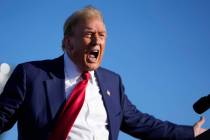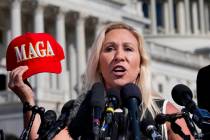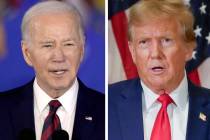Trump fulfills campaign promise with deal to replace NAFTA

WASHINGTON — President Donald Trump delivered on a key 2016 campaign promise last week when he announced that he had brokered a trade deal with Mexico and Canada to replace the 24-year-old NAFTA, which he called the “worst trade deal ever.”
The Rose Garden news conference on Oct. 1 presented a moment that encapsulated the Trump presidency: a policy triumph amid insistent press questions about a political hot potato, Supreme Court nominee Brett Kavanaugh.
Trump had prodded Canada to agree to reduce dairy trade barriers, and join Mexico, which in August agreed to concessions designed to boost U.S. automotive manufacturing. But his triumph in corralling a trilateral pact was overshadowed by the furor surrounding the Kavanaugh confirmation vote.
In the end, Trump got his deal to replace the North American Free Trade Agreement and his choice for the high court won confirmation.
Determined to crow about the new agreement last week, the Republican president reminded voters of his commitment to boosting blue-collar jobs. “I used to say, ‘How could anybody have signed a deal like NAFTA?’” Trump asked rhetorically.
Trump recalled watching manufacturing jobs leave New England and the Rust Belt. “The factories were leaving, people were being fired,” he said, “and we can’t have that.”
Trump boasted that his new deal — with a new name, USMCA, for U.S.-Mexico-Canada Agreement — “will transform North America back into a manufacturing powerhouse.”
The new agreement was forged just before a midnight Sept. 30 deadline imposed by the U.S. to include Canada in a deal reached with Mexico late in the summer.
Lightning rod for criticism
NAFTA has long been a lightning rod for criticism among labor unions and manufacturing workers since it was being negotiated in the early 1990s during President George H.W. Bush’s administration and later implemented by President Bill Clinton.
The new agreement would give U.S. farmers greater access to the Canadian dairy market. But it would keep NAFTA’s dispute-resolution process that the U.S. wanted to jettison. It offers Canada protection if Trump goes ahead with plans to impose tariffs on cars, trucks and auto parts imported into the United States.
NAFTA reduced most trade barriers in North America, leading to a surge in trade between the three countries. But Trump and other critics said it encouraged manufacturers to move south of the border to take advantage of low Mexican wages.
The new pact will require regional content of 75 percent for automobiles, and also that 40 percent to 45 percent of vehicles coming to the U.S. be produced in plants paying at least $16 per hour.
The White House predicted the deal would boost wages, promote trade for American dairy farmers and boost automobile manufacturing — all part of Trump’s plan to increase high-paying blue-collar jobs.
The new three-country deal offered another plus – an opportunity for Trump to one-up his predecessor, President Barack Obama, who famously said in 2012, “There are some jobs that are not going to come back.”
“The fact that both Mexico (on autos) and Canada (on dairy) took some small steps to appease Trump’s demands should not be surprising – the U.S. is more important to their economies than vice versa,” economist George Gertz wrote for the nonpartisan Brookings Institution. “Does this imply Trump was right all along, that previous American trade negotiators had been foolishly taken advantage of? Hardly.”
Gertz warned, “Mexico and Canada won’t forget how the U.S. treated them.”
Message for China
National Economic Council Director Larry Kudlow said that USMCA sent a strong message to China, as Washington and Beijing are involved in hardball trade negotiations.
Expect an official signing ceremony before Dec. 1, so that Mexican President Enrico Peña Nieto can sign the deal before he leaves office. However, Congress must ratify the treaty for it to become law and a vote is not likely until 2019 – when supporters will have to win over free-trade Republicans and anti-Trump Democrats.
Henry Olsen, author of “The Working Class Republican: Ronald Reagan and the Return of Blue-Collar Conservatism,” predicted Americans will not see “a typical Republican versus Democrat vote.”
“I would expect to see tensions in the Republican Congress,” Olsen said, adding that he expected free traders to “reluctantly support it.”
Olsen described the USMCA as “an updated NAFTA — with important changes to the United States.” He reasoned Republicans are bound to prefer a new NAFTA to no NAFTA, which could occur if Trump walks away from the Clinton-era pact absent a replacement agreement.
Senate Minority Leader Chuck Schumer, D-N.Y., praised Trump for taking steps to improve NAFTA, which the senator opposed for many years, while he withheld support for the deal pending more detailed knowledge. Schumer added, “any final agreement must be judged on how it benefits and protects middle-class families and the working people in our country.”
“Republicans in Congress are wary of Trump’s protectionists instincts,” Gertz noted, while Democrats “are unlikely to actively help realize one of his key campaign promises.”
Contact Debra J. Saunders at dsaunders@reviewjournal.com or 202-662-7391. Follow @DebraJSaunders on Twitter. The Associated Press contributed to this report.
U.S.-Mexico-Canada Agreement
— Mandates that at least 40 percent of auto content workers earn at least $16 per hour.
— Requires 75 percent of auto conent be produced in North America.
— Reduces Canadian trade barriers to U.S. dairy and wheat.
— Protects U.S. copyrights and patents



















